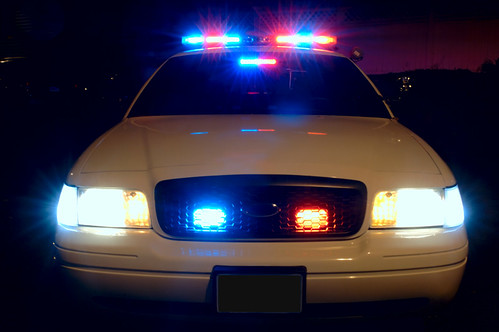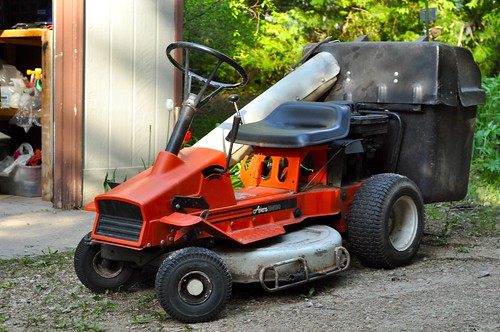He followed us close to a mile, only turning on the sirens and lights as we made the turn onto my gravel road. There I sat, fifteen and wedged between my boyfriend and one of his friends in the cab of his truck. The bright orange car skidded to a stop beside us as the officer motioned for them to stop, too.
We were kids. We did stupid things. In this particular instance, we had thrown some soda bottles with dry ice and water in them off my mom's back porch and into her big, empty yard. My neighbors (separated from the explosion by a heavy patch of woods and several football field lengths of grass) had called the police, and here we were--hours later--being patted down as the blue and red lights bounced off the trees and empty fields around us. The cops took my friend's cigarettes out of his pocket, and my friend's hands shook when he handed them back.
"What do you have in your pockets?" an officer asked me, nicely, no hint of anger in his voice. I showed him the contents: an Altoids tin covered in a magazine-clipping collage holding some crumpled one dollar bills, a set of keys with a Pez dispenser key ring. "Do you need me to get out?" I asked, my voice cracking as I watched him empty the pockets of my friend. "No, it's cold out here," he said with a smile.
They searched our car for guns (what gun could have made the sound they were investigating, I'm not sure. Certainly not one we could have easily concealed under the seat.) Tired of playing dumb, the friends in the other car 'fessed up to the dry ice bombs. The cops let us go.
I grew up in a very rural area. We had a lot of open space to do a lot of stupid things. Underage drinking was very, very common. Many of my friends did drugs. People drove around on backroads long before they had driver's licenses. There were plenty of laws broken.
But we escaped high school without a record. When the cops found someone putting a couch in the middle of the road (that wasn't me or mine, I promise), they just made them take it back and then told their parents the next day. When someone was pulled over with a case of beer in the back seat, the police took it away.
I tell you this not to excuse any of my past behavior but to contextualize it. Every person I knew as a teenager did something illegal: spray-painted stop signs, bottle rocket fights, lawn mower races, skinny dipping.
I am willing to bet that if you think really hard, you'll be able to recall some dumb things you did when you were younger, too. You might even be able to remember some dumb things you've done more recently than that.
These memories come back to me as I watch my students struggle, and I get angry.
I didn't realize just how pervasive criminal records would be when I started my job as a community college teacher in an urban area. Many, many of my students are convicted felons who have only recently been released from serving prison time. A lot of them are on parole. Some wear ankle bracelets. I have only been teaching there for a year, and yet I have looked at jail and court papers numerous times as students try to explain their mysterious and sudden absences.
Some people use this as evidence to suggest that my students are troubled people who need to get their lives right. They're not always wrong. Many of my students appear to have made some bad choices, and many of them know it and work hard to set it right.
But I have to wonder . . .
How many of my students are in the system for things that me and my friends did? How many of them have been booked on a loitering charge? How many have fallen victim to the high racial disparity in marijuana arrests? How many of them were arrested for non-violent offenses designed solely to criminalize their existence (like the ridiculous sagging pants law my city has proposed)? How many of them are getting lifelong records for things the neighborhood cops casually swatted our wrists for?
I am not excusing criminal behavior (though I know some will still see it that way). I've had things stolen from me. There have been gunshots ringing outside my door. I have been scared to walk around after dark. I want to live in a safe city as much as you do.
But what good is it doing to drag students who are trying to get their lives together back to court over petty technical violations when it means they miss class? What good does it do to lock someone up for two weeks over an unpaid fine when it means they now can't finish the semester and are going to get fired for missing work? What does it do except perpetuate a system in which criminal acts become more and more likely?
Here are some facts:
- The United States has the most per capita inmates of any country in the world. We have 734 out of every 100,000 people behind bars.
- The racial disparity in the prison system is astounding. One in three black men can expect to go to prison in his lifetime. Students of color make up 70 percent of the arrests referred by school law enforcement. Once arrested, people of color receive longer sentences than white people who commit the same crimes.
- The "War on Drugs," which has driven many of these incarcerations, is a failure. We're the number one country for illegal drug use, and the criminal penalties have (much like with Prohibition) driven up the violent crime surrounding the drug trade.
- We spend way more on incarcerating people than we do educating them:
 |
| Source: CNN |
Now, though, those beliefs are sharpened by a personal knowledge of students who are working hard and getting caught up, students who are smart and talented and need the chance to show it, students who really aren't any different from the friends I grew up with except for in the way that our actions were viewed.
So many people are quick to write these students off, but I'd be willing to bet that they're not that different from the friends they grew up with, either.
Photo: Scott Davidson, tyle_r



You say you're not excusing criminal behavior, but that is what you're doing. You're writing off your own transgressions in the past and you're doubting the legitimacy of the convictions of those students who have been through the criminal justice system based on no more than personal bias and suspicion. You don't even know what they did, but you doubt that it was serious enough to warrant incarceration or punishment?
ReplyDeleteYou appear to have gotten lucky in your youth and gotten away with some dangerous behaviors and minor law-breaking. In rural areas, the police are probably more likely to let people off for these things than in suburban or urban ones because tossing bottles full of dry ice is less dangerous when there aren't many people around and private property is less "private". When there are more people and cars (and children who may travel in the streets for play, biking, or skateboarding), the behavior is more dangerous to everyone.
You imply that everyone did bad things when they were younger like underage drinking and pranks that were against the law and it seems you're trying to say without saying that kids you teach now are probably being charged for such things based on racial bias. Again, you say this with no evidence beyond your suspicions. You don't know the crimes. You don't know the circumstances. You just express concern that they've been punished in some way at all and use race as the sole criteria for that opinion.
If your kid was in a car and had an accident because someone left an enormous piece of furniture on the road or if she was hiking through the woods and her feet were cut to ribbons because some kids were hucking bottles around and the glass was hidden in the foliage, you might feel a little differently about just letting such things go. This is a pretty irresponsible post, especially from a parent.
This is not a post about just letting things go. And I do know what several of these students have been charged with (they've shown me their court documents, after all.) I am just not willing to share their personal stories in a public space.
ReplyDeleteI never said that there shouldn't be penalties for pranks or crimes, but there is a big difference in how pranks and crimes are handled in different communities. Some of that is about physical space (urban/rural) and some of it is about race. You say I gave no evidence of racial bias, but I did. I linked to studies showing local racial bias in marijuana arrests and national racial bias in charging and sentencing.
I don't see how placing barriers to someone getting an education, a job, a house, etc. when the crime committed was non-violent helps make the world a safer place. People who cannot get jobs or an education often commit more serious crimes.
America is not the safest country, but we have the most people behind bars. What good is that doing? Who are we helping by creating a prison industry that spends billions housing people for something as small as marijuana possession while our education system is drained of money? How is it "irresponsible" to suggest that maybe we need to question a system that by practically any measure is not working well?
"""But I have to wonder . . .
ReplyDeleteHow many of my students are in the system for things that me and my
friends did? How many of them have been booked on a loitering charge?"""
Did you ask them?
In some cases, but in some cases it's clear that they're trying to leave the past behind them and don't want to talk about it.
ReplyDeleteIt's not easy finding a safe environment. It's not easy -creating- a safe environment.
ReplyDelete